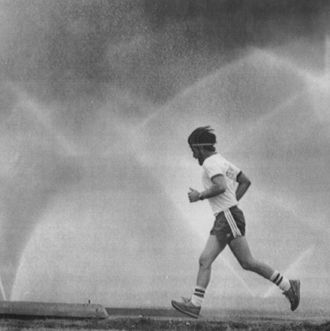
The ultramarathoner, as Science of Us has noted before, is a special sort of person. Generally, when people think about running and intensity, the two seem to follow a pretty correlated path: The more one runs, the more intense one must be. Running a 10K? Pretty low-key. A half? Not too bad. A marathon? Whoa, now we’re getting into intense territory. And ultramarathoners — those badass runners tackling distances that exceed the 26.2 of marathons, sometimes up to or more than 50 or 100 miles? Clearly, ultramarathoners are the most intense, gritty individuals.
What is the point, the uninitiated may wonder, of all that running? While most people associate running with physical fitness, many ultramarathoners argue that the reason they run isn’t to get muscles or maintain cardiac health. Instead, as Quartz reports this week, it’s to attain some sense of “flow,” that nebulous term that’s associated with that other very fuzzy concept runners toss around, “runner’s high.”
Claremont Graduate University psychology professor Mihaly Csikszentmihalyi first coined the term flow in 1990. In a 2004 TED Talk, Csikszentmihalyi expounded on the idea, going so far as to say that it’s the key to happiness. “His body disappears, his identity disappears from his consciousness, because he doesn’t have enough attention, like none of us do, to really do well something that requires a lot of concentration, and at the same time to feel that he exists,” Csikszentmihalyi said. “So existence is temporarily suspended.”
Sounds a lot like the state of mind even casual runners can recognize. Czikszentmihalyi argues that the power of flow — basically, getting in the zone, cranking out your best stuff, and just being awesomely lost in a creative process — is something we can harness in all aspects of our lives. Runners often gush about a runner’s high, when endorphins basically flood their brains into feeling accomplished, focused, and strong. But Czikszentmihalyi says that you, too, mere mortal, can harness the power of the flow. His research indicates that the ideal flow occurs “when your challenges are higher than average and skills are higher than average.”
In other words, you should be challenging yourself in a passion project in a field you know you can conquer and are pretty good at — but not quite yet the best at. You want to feel challenged, Czikszentmihalyi said, because you want to “feel comfortable, but not very excited.”
This all culminates in that near-spiritual feeling of Zen and nirvana that runners often try to explain but can’t quite. In a recent New Yorker story exploring the intersection of spirituality and running, one runner suggested simply that he ran for a “sense of accomplishment.” “We’re more likely to feel proud of something new that scares us,” he suggested. That’s the essence of flow: taking on something a little intimidating, conquering it, and relishing in the unbeatable reward of being able to do what was just a short while ago seemingly impossible. And if someone wants to chase that feeling for 50-plus miles, well, who can blame them?




